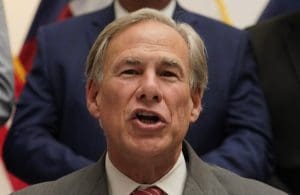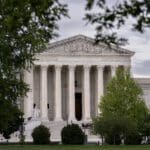LGBTQ advocates take legal action against Republican governors' anti-trans policies
‘The governor doesn’t make the law,’ said Shelly Skeen of Lambda Legal. ‘The family code in fact says that parents should be providing medically necessary care to their kids.’

Advocates for LGBTQ people are taking action in response to Republican governors’ efforts to stop transgender people in their states from receiving gender-affirming health care and to punish families who help them receive it.
Gender-affirming health care, which medical organizations such as the American Academy of Child and Adolescent Psychiatry, the American Academy of Pediatrics, and the American Medical Association say is vital to the well-being of transgender youth, can include hormone treatments; prescription medications that temporarily stop puberty, known as puberty blockers; and gender-affirming surgeries on the chest (“top”) and genitals (“bottom”). Bottom surgeries in particular are rarely performed on trans people under age 18.
In February, Republican Texas Gov. Greg Abbott directed the Texas Department of Family and Protective Services to investigate on suspicion of child abuse families who have supported their trans child’s medical transition.
In Florida, the administration of Republican Gov. Ron DeSantis in June proposed a rule that would ban Medicaid coverage of gender-affirming care.
National and state groups advocating for the rights of LGBTQ people are taking legal action and speaking out against such proposals and directives to limit trans people’s rights.
Lawsuits have been filed by groups such as Lambda Legal and the ACLU in response to Texas Republican Attorney General Ken Paxton’s opinion that gender-affirming care constitutes child abuse and Abbott’s order in February that the Texas Department of Family and Protective Services investigate families who provide it to their children. Some families have since told reporters and lawyers about visits to their homes from Child Protective Services.
One lawsuit, Doe v. Abbott, was filed against Abbott, the Texas DFPS, and the department’s commissioner by a number of rights organizations on behalf of a trans teen and her family who said they had been visited by a child welfare investigator under Abbott’s directive.
Although Judge Amy Clark Meachum of the Travis County 201st District Court issued an injunction in March that stopped the investigations, Paxton appealed it, and the Supreme Court of Texas eventually upheld a lower court’s overturning of the injunction in May, allowing investigations to go on while halting the investigation of the plaintiff family.
The court noted in its ruling, however, “The Governor and the Attorney General were certainly well within their rights to state their legal and policy views on this topic, but DFPS was not compelled by law to follow them. DFPS’s press statement, however, suggests that DFPS may have considered itself bound by either the Governor’s letter, the Attorney General’s Opinion, or both. Again, nothing before this Court supports the notion that DFPS is so bound.”
PFLAG v. Abbott is a second lawsuit filed against the same defendants on behalf of the organization of families, friends, and other allies that works for LGBTQ rights and three families living in Texas. According to the plaintiffs, there are more than 600 PFLAG members in Texas. Judge Jan Soifer of the Travis County 345th District Court granted a temporary restraining order in the case in June, finding that unless the Texas DFPS were enjoined from carrying out the administration’s order and opinion, “the Voe, Roe, and Briggle families (collectively, ‘Plaintiff Families’) and members of Plaintiff PFLAG will suffer immediate and irreparable injury” including
gross invasions of privacy in the home and school, and the resulting trauma felt by parents, siblings, and other household members; outing an adolescent as transgender; adverse effects on grades and participation in school activities; fear and anxiety associated with the threat of having a child removed from the home; increased incidence of depression and risk of self-harm or suicide; the deprivation or disruption of medically necessary care for the parents’ adolescents; having to uproot their lives and their families to seek medically necessary care in another state; being placed on the child abuse registry and the consequences that result therefrom; and criminal prosecution and the threat thereof.
According to Shelly Skeen, a senior attorney with Lambda Legal, a hearing was held Wednesday in the 201st District Court on whether to stop all investigations into the families involved while the case is active, but Meachum had not reached a decision by the end of the day. The temporary restraining order expires on Friday.
“We’re saying that, number one, that what the governor did back in February was outside of the bounds of the authority that he had to direct the DFPS, because the governor doesn’t make the law,” Skeen said. “The law is made by the Legislature and the Legislature did not in any way change what the family code requires. The family code in fact says that parents should be providing medically necessary care to their kids.”
Skeen added that if the judge stops the investigations while the case is active, no new investigations of the plaintiffs in the case would begin until it goes to a final trial, which could be eight or nine months from now. She said that there would also be a trial in the Doe v. Abbott case at some point.
Meanwhile, LGBTQ advocates are readying themselves for the fight in Florida, where the Florida Agency for Healthcare Administration will hold a public hearing on July 8 on its proposed rule to stop Medicaid from covering gender-affirming care for trans people.
Jon Harris Mauer, the public policy director at Equality Florida, said that his organization, Lambda Legal, and the Southern Legal Counsel law firm will be present at the hearing and that he expects medical professionals and people who have received gender-affirming care to attend as well.
DeSantis and Abbott continue to make statements and policy in their states that encourage anti-LGBTQ activism and legislation.
Florida’s Parental Rights in Education law, dubbed “Don’t Say Gay” by opponents, which limits the discussion of LGBTQ subjects in schools, took effect on July 1.
DeSantis has also talked about investigating families that let their children attend drag events, saying in June that child protective statutes could be used to prevent them doing so. During a press conference on June 8, joining a chorus of Republican figures using a video of a protest at a Dallas drag show as fuel for their latest anti-LGBTQ talking point, DeSantis said, ”We have laws against child endangerment. It used to be kids would be off-limits. Used to be everybody agreed with that. Now it just seems like there’s a concerted effort to be exposing kids more and more to things that are not age appropriate,”
Both Florida and Texas enacted bans on trans student athletes playing on the appropriate teams for their gender in 2021.
Abbott and DeSantis are both running for reelection this year.
While he has not confirmed that he would run, DeSantis is seen as a potential candidate for president in 2024. Reuters reported on Thursday that he has increased his out-of-state social media ads, and a political group called Ready for Ron is working to create support for a DeSantis run.
Published with permission of The American Independent Foundation.
Recommended

Rosenblum, other Democratic AGs ask SCOTUS to block red state bans on emergency abortions
Oregon Attorney General Ellen Rosenblum and nearly two dozen other Democratic-led states urged the U.S. Supreme Court to preserve the ability of emergency room doctors to provide abortions, arguing that failing to do so would have devastating effects for their health care systems and women across the country.
By Gloria Rebecca Gomez, Arizona Mirror - April 01, 2024
Ken Paxton paid $2.3 million to defense lawyers for impeachment trial
The lawyers were paid from his campaign, according to a report filed this week.
By Patrick Svitek, The Texas Tribune - January 18, 2024
Texas governor and attorney general do little to curb state’s chemical plant crisis
Republicans Greg Abbott and Ken Paxton have taken thousands of dollars in donations from chemical companies and their affiliated PACs.
By Jesse Valentine - December 08, 2023









































































